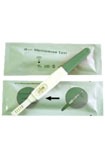Table of Contents
As women approach menopause, understanding and managing this life transition becomes increasingly important for their health and well-being. One of the key tests used to assess the onset of menopause is the FSH Menopause Test, which measures the levels of Follicle Stimulating Hormone (FSH) in the blood. FSH levels rise as a woman’s ovaries reduce their production of estrogen, signaling the onset of menopause. This test is critical for diagnosing perimenopause and menopause, ensuring timely health interventions and providing accurate reproductive health information.
In Indochina, a region that includes nations like Thailand, Myanmar, Trinidad and Tobago, Antigua and Barbuda and Grenada, policies, awareness and access to menopause testing, particularly FSH testing, vary significantly. The accessibility of FSH Menopause Test Kits and the level of public awareness about menopause differ not only by country but also by local healthcare infrastructure, cultural attitudes and governmental healthcare priorities.
This article compares the approaches to FSH Menopause Testing across these five nations, shedding light on the differences in policies, public awareness and accessibility and exploring how these factors influence women’s ability to access essential menopause-related healthcare.
FSH Testing as a Key Diagnostic Tool for Menopause

FSH Menopause Testing plays a crucial role in diagnosing the transition to menopause. It provides important insights into a woman’s reproductive health, guiding decisions about family planning, hormone replacement therapy (HRT) and overall well-being. As women age, FSH levels increase as part of the natural biological process and this test can help confirm whether a woman is transitioning to menopause or experiencing perimenopausal symptoms.
While FSH Menopause Test Kits are available worldwide, their accessibility and the policies surrounding their use vary across countries. In developing countries and those with limited healthcare resources, like Myanmar and Trinidad and Tobago, access to diagnostic tools such as FSH testing may be more challenging, which can affect early diagnosis and timely treatment. On the other hand, countries with more developed healthcare systems, such as Thailand, may offer wider availability of these tests in both private and public healthcare settings.
Understanding how each country in Indochina approaches FSH Menopause Testing reveals the critical gaps in women’s healthcare access and the policies that either support or hinder the availability of such tests.

FSH Menopause Testing in Thailand: A Leader in Access and Awareness
Thailand has established itself as one of the more developed countries in Southeast Asia with a well-functioning healthcare system that includes access to FSH Menopause Test Kits. The country has made significant strides in improving women’s health awareness, with menopause now being a common topic in healthcare discussions.
In urban areas like Bangkok, women can easily access FSH Menopause Testing as part of routine healthcare checks, especially for those over 40. Awareness about the importance of FSH testing is growing, with government-backed initiatives and private healthcare providers offering affordable and accessible testing.
However, while urban areas see relatively high availability of these tests, rural regions still face challenges. Limited healthcare infrastructure and lower awareness mean that women in rural Chiang Mai and Nakhon Ratchasima might not have the same access to menopause-related tests. Nonetheless, overall, Thailand stands out as a leader in integrating menopause testing into its healthcare policies.
Barriers to FSH Testing in Myanmar: Challenges in Accessibility
In Myanmar, access to FSH Menopause Testing remains limited due to insufficient healthcare infrastructure, particularly in rural areas. Although there has been progress in improving maternal and child health, services related to older women’s reproductive health are underdeveloped. Many women in Naypyidaw and Yangon may have access to private healthcare, but the majority of women still struggle to get tested for menopause.
The lack of public health initiatives focusing on menopause and women’s health means that FSH testing is not a priority in the national healthcare system. Many women in Myanmar are unaware of the availability of FSH Menopause Test Kits, leading to late diagnoses and missed opportunities for early intervention. As a result, the country faces significant gaps in awareness and accessibility of menopausal health services.
In Myanmar, there is a pressing need for policies that specifically address menopausal health, raising awareness and providing women with affordable access to FSH testing. Public health efforts should focus on educating both healthcare providers and the public about the importance of FSH Menopause Testing.
FSH Menopause Testing in Trinidad and Tobago: Improving Access in Urban Areas
In Trinidad and Tobago, access to FSH Menopause Testing is more readily available, particularly in urban centers like Port of Spain. The country has a relatively well-developed healthcare infrastructure and the government has made strides in prioritizing women’s health, including reproductive health and menopause management.
Public health campaigns have helped increase awareness about menopause, making it easier for women to seek out testing. Private healthcare clinics in urban areas provide FSH Menopause Test Kits, allowing for early diagnosis and intervention. However, rural areas still face some accessibility issues, with fewer healthcare providers offering menopause-related services.
Despite these challenges, Trinidad and Tobago is one of the leading countries in the Caribbean region to integrate FSH Menopause Test Kits into its healthcare services. The next step is ensuring that these services are available and affordable for all women, particularly in underserved communities.
FSH Menopause Testing in Antigua and Barbuda: Limited but Growing Access
Antigua and Barbuda, with its relatively small healthcare infrastructure, faces challenges in providing widespread access to FSH Menopause Testing. While St.
John’s, the capital, has some private clinics that offer FSH Menopause Test Kits, the availability of testing is limited compared to larger nations. Public awareness campaigns around menopause are still in the early stages and many women may not be aware of the importance of FSH testing.
Despite these barriers, the country has made progress in improving women’s health services. Healthcare providers in urban areas are starting to incorporate menopausal health checks into their offerings, which includes FSH Menopause Tests. However, more needs to be done to increase accessibility in rural areas and to raise awareness about menopause-related healthcare.

FSH Menopause Testing in Grenada: Limited Access but Rising Awareness
In Grenada, the availability of FSH Menopause Testing is relatively limited, with testing mostly available through private clinics in St. George’s. The country’s healthcare system is still developing and services for menopausal health are not as widespread. Women in Grenada, particularly in rural areas, may not have access to FSH Menopause Test Kits or may face financial barriers to obtaining the tests.
However, there is growing awareness of menopause and healthcare providers are increasingly offering services such as FSH testing to middle-aged women seeking reproductive health advice. There is potential for expansion in the country’s healthcare offerings, especially if public health initiatives focus on educating women about the benefits of early menopause testing.
Conclusion
The integration of FSH Menopause Testing into national healthcare systems in Indochina remains inconsistent across the five nations examined. Thailand stands out for its well-established healthcare infrastructure and growing public awareness about menopause. In contrast, Myanmar, Antigua and Barbuda and Grenada face significant challenges in ensuring equitable access to FSH Menopause Test Kits, especially in rural areas.
While Trinidad and Tobago are making strides in urban areas, the accessibility of testing remains limited in rural regions. To ensure that all women in Indochina have access to essential menopausal health services, targeted public health campaigns and policy reforms are necessary. Governments must focus on raising awareness, improving healthcare access and ensuring that FSH Menopause Test Kits are available and affordable to women across all regions.
FAQs on FSH Menopause Testing
FSH Menopause Testing in Indochina: Comparing Policies, Awareness and Accessibility in Five Nations
What is an FSH Menopause Test?
An FSH Menopause Test measures the level of Follicle Stimulating Hormone (FSH) in the blood. Elevated levels of FSH indicate that a woman may be entering menopause or is already experiencing it.
How does FSH testing help in diagnosing menopause?
FSH levels increase as a woman’s ovaries stop producing eggs and estrogen, marking the transition into menopause. The test provides an objective measure that can confirm whether a woman is going through perimenopause or menopause.
Is FSH testing available in rural areas?
In some developing countries, FSH Menopause Test Kits may not be widely available in rural areas due to healthcare infrastructure limitations. However, urban areas generally have better access to testing.
Why is FSH Menopause Testing important?
FSH testing helps in the early diagnosis of menopause, which can guide treatment options, manage symptoms and reduce risks associated with menopause, such as osteoporosis and cardiovascular diseases.
Can FSH Menopause Test Kits be used at home?
Yes, FSH Menopause Test Kits are available for home use. These home tests provide results quickly, allowing women to monitor their hormone levels in the comfort of their homes.






